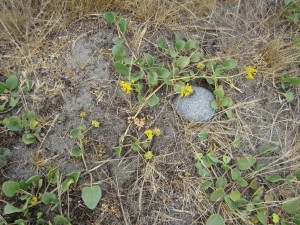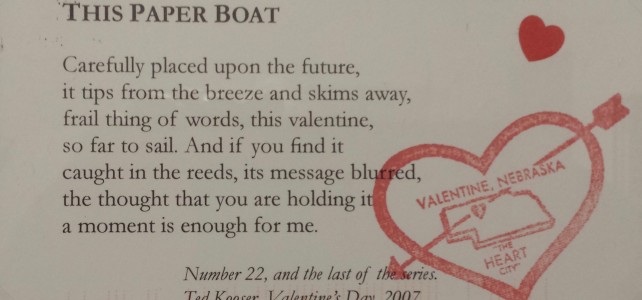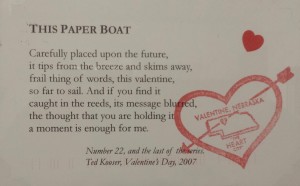
PHOTO: Mary van Balen Whidbey Island
Originally published in The Catholic Times
A few weeks ago in Barnes & Noble, while browsing through the bookstore looking for an old book they didn’t have, I wandered into the poetry section and picked up a slim, hardback volume with “Felicity” and “Mary Oliver” writ large in white across the soft gray sky on the cover.
I stood and read a poem about St. Augustine. “Take heart,” it said to me. Augustine didn’t become himself overnight. There was one about a cricket, finding its way into a house in the fall.
I’ve been on a Mary Oliver jag ever since, pulling out books I already own, ordering Felicity and the second volume of “New and Selected Poems.” She’s a master of attention and mindful living. Her poems are prayer, savoring the Sacred in our midst, perhaps in an armful of peonies or a heron’s flight. “I want to make poems while thinking of/the bread of heaven and the/cup of astonishment… (from “Everything” in New and Selected Poems – Volume Two).
There is something about the grace of her poetry that anchors me when reports of violence, hatred, and fear threaten to overwhelm. The news we hear most often is bad, and while my daughter assures me that we live in a world with less, not more, violence than in centuries past (We just hear about more of it, she says), some days this planet seems a dangerous place careening towards disaster.
Yet, in this same time and place there is hope. There is goodness and love that refuse to give in to despair. There is mercy and forgiveness. There are people who, little by little, replace darkness with light by simply living as best they can, showing kindness and compassion along the way. They speak the truth they know and go about the ordinary tasks of life. There is Spirit, shared with each of us, who draws us to goodness if we allow, and empower us to make life’s journey as partners with the One who is transforming the world.
Poets express in words (and the spaces between them) something of this mystery and their experience of it, inviting readers to participate. I suppose, now and again, a line or two, or even a complete poem moves quickly and effortlessly from heart to word, but that is a rare mercy—the inbreaking of Spirit to a practiced soul, aware and open to such things.
Poets I’ve known and my attempts at writing verse, have taught me that writing poetry is work. Ted Kooser, U.S. poet laureate 2004-06, once surprised my adult GED students by sharing his writerly routine (up early every morning for fifty years, writing an hour and a half before leaving the house) and the revelation that he had revised one of their favorite, very short poems 50 times.
The same daughter who assures me the human condition is actually improving can’t imagine why anyone would want to write—for her, it’s agony. But, as poet Maya Angelou’s quote on a postage stamp states, “A bird doesn’t sing because it has an answer, it sings because it has a song.”
Poets write because that is what is they are made to do, and they are faithful. A poem in “Felicity” moved me to remember that we all are made to be a particular reflection of God in the world and that we, the world, and the cosmos are better off when we’re faithful to it. Jesus is the perfect example of such authentic living: He is God’s own life, and he shares it with us.
 The poem is “Roses.” Oliver writes of the quest to answer life’s “big questions” and decides to ask the wild roses if they know the answers and might share them with her. They don’t seem to have time for that. As they say, “…we are just now entirely busy being roses.”
The poem is “Roses.” Oliver writes of the quest to answer life’s “big questions” and decides to ask the wild roses if they know the answers and might share them with her. They don’t seem to have time for that. As they say, “…we are just now entirely busy being roses.”
How glorious if all humanity could know themselves as honestly and be themselves as genuinely as those roses. But we are wounded, and there is evil, and taking time to be still and listen to the Spirit within is difficult in the busyness of daily life.
The universe suffers from this disconnect. We see that in the eyes of the poor, marginalized, and war-weary. We see it in eyes reflecting anger, hatred, and fear that fuel violence. We hear it in the groaning of our planet with melting icecaps and water and air that poison its creatures
April is national poetry month. What better time to listen to the poets among us, past and present, who speak their truth and encourage us to do the same.
© 2016 Mary van Balen


 Happy poetry month! I was pleased to see Ted Kooser, former US Poet Laureate
Happy poetry month! I was pleased to see Ted Kooser, former US Poet Laureate  During one of his presentations he had made the generous offer of sending a valentine poem to anyone who’d like to receive one. He’d been doing it for years, he explained. I gave him my daughters’s address and my own. Sure enough, when Valentine’s Day came around we both received a postcard from Ted Kooser, postmarked in Valentine, Nebraska. It hangs, framed on my office wall.
During one of his presentations he had made the generous offer of sending a valentine poem to anyone who’d like to receive one. He’d been doing it for years, he explained. I gave him my daughters’s address and my own. Sure enough, when Valentine’s Day came around we both received a postcard from Ted Kooser, postmarked in Valentine, Nebraska. It hangs, framed on my office wall.